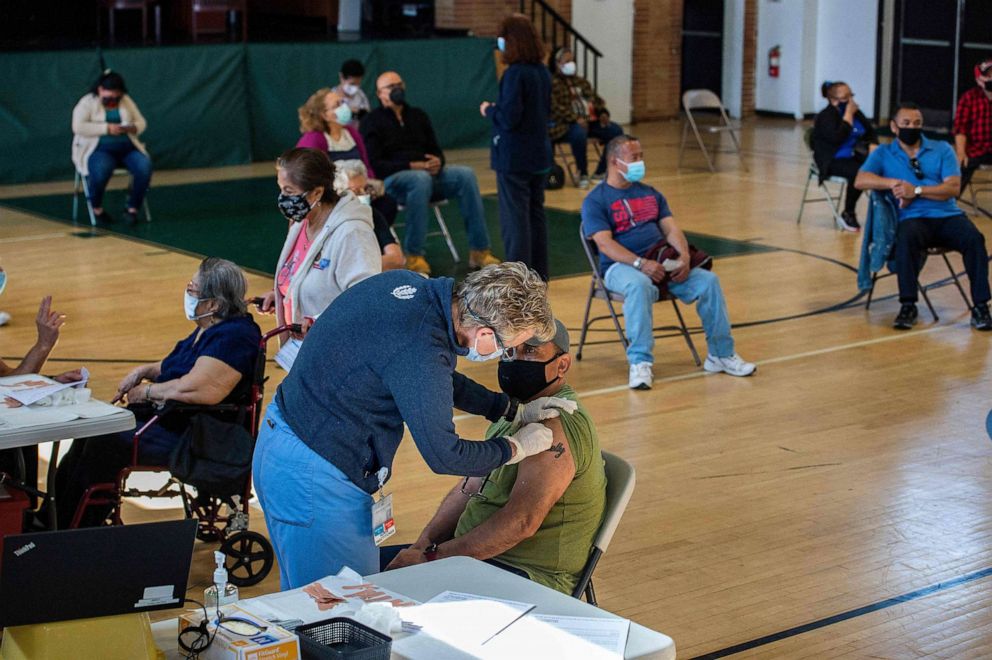How to prepare for your long-awaited COVID-19 vaccine appointment
After months of waiting, it may finally be your turn to get a COVID-19 vaccine.
Anyone 16 years old and older is entitled to a free vaccine that has been shown to be safe and effective at preventing severe illness and death from COVID-19.
Vaccine day comes with more than the shot itself -- including the potential for a wait in line, possible warm or cold conditions and a lot of emotions.
Half the country has already received at least one dose, so here are some quick pro tips about how to prepare when it's your turn.
What to do -- and what not to do
Dress for success: Put on those comfortable shoes as standing and walking throughout the process may be necessary. Also, be ready to expose your upper arm when it's time for the injection. Most people choose to get injected in the arm they do not write with in case they become temporarily sore.
Start your day off with a good breakfast. Come to the site well-fed, hydrated and bring an extra bottle of water, as sometimes the stress of the experience or all the waiting and up and down can make people lightheaded.
Doctors recommend avoiding over-the-counter medications like ibuprofen, acetaminophen or antihistamines before getting the shot. "Some people are trying to lessen vaccine side effects, but we don't know how much these medications affect vaccine effectiveness. When you have side effects, what you're feeling is your immune system at work trying to build up that immunity," said Dr. John Brownstein, the chief innovation officer at Boston Children's Hospital and an ABC News contributor.
"After the vaccine, people may want to try and prepare to take a lighter day or two of work," added Brownstein.
If you develop side effects after the vaccine, it's OK to take a Tylenol, Advil or some other over-the-counter medication.

What side effects are typical?
"The most common side effects are the ones you can also get from other vaccines: mild fever, headache, fatigue, joint pain, pain or swelling at the site of the vaccine. There is nothing unusual about any of those," said Brownstein. "There may be slight differences between vaccine types, but they are generally pretty consistent."
These mild symptoms may develop over the first couple days and should be temporary.
Some people may also notice an itchy rash on their arm where they were vaccinated, which has been coined "COVID arm." The Centers for Disease Control and Prevention still recommend that people who have "COVID arm" get their second vaccine on schedule.
It is important to remember that long-term health problems from the COVID vaccine are extremely unlikely. Most people who have side effects will have them within six weeks of their vaccine, according to the CDC.
When should I be concerned?
"It is those one in a million, incredibly rare, serious side effects that you should speak to a provider about, such as persistent headache, a full-body rash, swelling, abdominal pain, leg pain, shortness of breath," cautioned Brownstein. These are the symptoms for which you should contact your doctor.
"We watch everyone for 15 minutes after their vaccine, to monitor for anaphylaxis, but this risk is extremely low," Dr. Richard Shellenberger, the associate program director of internal medicine at St. Joseph Mercy Hospital, Ann Arbor, said.
Anaphylaxis is a type of severe allergic reaction characterized by breathing problems, hives, weakness, paleness, fast heart rate and dizziness. We encourage you to take full advantage of the 15-minute observation period, particularly if you have a history of reactions to vaccines.
"We certainly see side effects, but nothing has been serious. Out of more than 10,000 doses that we have likely given, we have not seen any serious reactions or anaphylaxis," Shellenberger added.

The CDC and Food and Drug Administration encourage you to report side effects in the Vaccine Adverse Event Reporting System (VAERS). The information in the VAERS system is user submitted, so the cases need to be investigated before a clear association with vaccination can be established.
If scientists find a connection between a safety issue and a vaccine, the FDA and the vaccine manufacturer will work toward an appropriate solution to address the specific safety concern.
Make sure to bring home your vaccine card and take a photo of it and store it in a safe place. It will help be evidence of vaccination and be a good reminder of which vaccine you received, the dates of your dose and any follow-up appointments required.
It's up to you if you want to share you vaccine selfie with those you care about, but with a little planning for the day you are bound to have a better experience yourself.
Karine Tawagi, M.D., a hematology and oncology fellow at Ochsner Medical Center in New Orleans, and Amanda Benarroch, M.D., a psychiatry resident at Mayo Clinic in Rochester, Minnesota, are both contributors to the ABC News Medical Unit.




